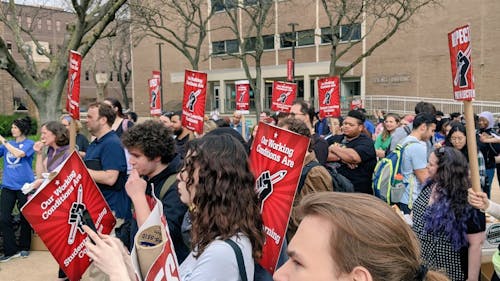First teaching strike in U. history to begin across all Rutgers campuses

Three unionized faculty groups across all Rutgers campuses will begin a work stoppage tomorrow at 9 a.m., marking the first teaching strike in the University's 257-year history.
Members of the Rutgers American Association of University Professors and American Federation of Teachers (AAUP-AFT), the Rutgers Adjunct Faculty Union (PTLFC) and the American Association of University Professors at the Biomedical and Health Sciences of New Jersey (AAUP–BHSNJ), are among those going on strike, according to the AAUP-AFT’s message to its members.
This evening, at 7:30 p.m., leaders from the three unions met to vote on finalizing the details of the strike action, Todd Wolfson, vice president of the Rutgers AAUP-AFT, told The Daily Targum.
Members of the AAUP–AFT and PTLFC will be stopping all University-related tasks, including checking their Rutgers-affiliated emails and phone numbers, Wolfson said. Members of the AAUP–BHSNJ will stage a modified strike, in which they will continue conducting essential research and medical work.
Last month, the three labor groups, consisting of 9,000 faculty members, voted overwhelmingly to authorize the strike due to the lack of progress made in labor contract negotiations with the University administration. Union members have been working without a contract since June 2022.
Wolfson said he hopes the 11,000 staff members in unions not directly involved with this strike will honor the action's picket lines and stop working. Ultimately, though, those decisions remain with those unions, he said.
Wolfson said that in order for the strike to end, key demands must be met for impacted groups such as part-time faculty, graduate student workers and undergraduate students.
Some of these demands include increased job security and "equal pay for equal work" for part-time lecturers, he said. Other demands consist of graduate students being paid a living wage and being recognized by the University administration as members of the AAUP-AFT.
Additionally, Wolfson said a major concession needed to end the strike would be for the entire union membership to be paid wages that match the current level of inflation.
"We want raises between 4 and 5 percent per year, and the University is giving us raises between 2.5 and 3 (percent) as their offers," he said.
Wolfson said that for students, the unions are asking the University to cease its practice of withholding students from registration and degrees if they owe fees or fines. The groups are also calling for the University to enact a rent freeze for all Rutgers residents, which includes students.
Before today's strike announcement, leaders of the AAUP-AFT told union members that University representatives did not attend a contract negotiation session on Friday. The union's statement said the administration's absence at the session was a sign that the University was not acting seriously in the union's pursuit of a resolution.
In contrast, according to a recent statement to NJ Advance Media, the University said it has constantly been negotiating with union members. On Saturday, mediators from the New Jersey Public Employment Relations Commission joined the negotiations to help bring the two sides into an agreement.
Criticism of the University's response to the union's requests is not novel. University President Jonathan Holloway has previously been criticized for threatening legal action against any striking workers, and it remains to be seen if Rutgers' administration will pursue legal action with respect to the strike.
Following the union's announcement, Holloway sent an email to the University community reacting to the strike and providing details on the administration's most recent contract offers. He also mentioned updated guidelines for students, faculty and staff to reference throughout the duration of the strike.
"The continued academic progress of our students is our number one concern, and we will do all that we can so that their progress is not impeded by a strike," he said.
In the email, Holloway said he remains hopeful that a resolution to negotiations will come soon but did not mention any legal action the University may choose to pursue.
"We will continue to negotiate, and I remain cautiously optimistic that we will quickly reach agreements with our employee unions," he said.
Since the strike announcement, Gov. Phil Murphy (D-N.J.) has publicly requested a mediation between the unions and the University in his office.
Tomorrow, the unions will be holding picket lines on all five New Brunswick campuses as well as on the Newark and Camden campuses.
Wolfson said union members remain focused on supporting students and their success. Should the strike proceed to threaten students' academic welfare or graduation prospects, the unions will proceed to reevaluate their demonstrations.
"In the long run, we believe winning this contract will be really good for learning conditions for students," he said. "But in the short term, obviously, there's no way to say that this won't impact students. We could be on strike for a week or two weeks, and students could miss classes. What I can say to you is the union will do everything within its power to protect and promote the students."



